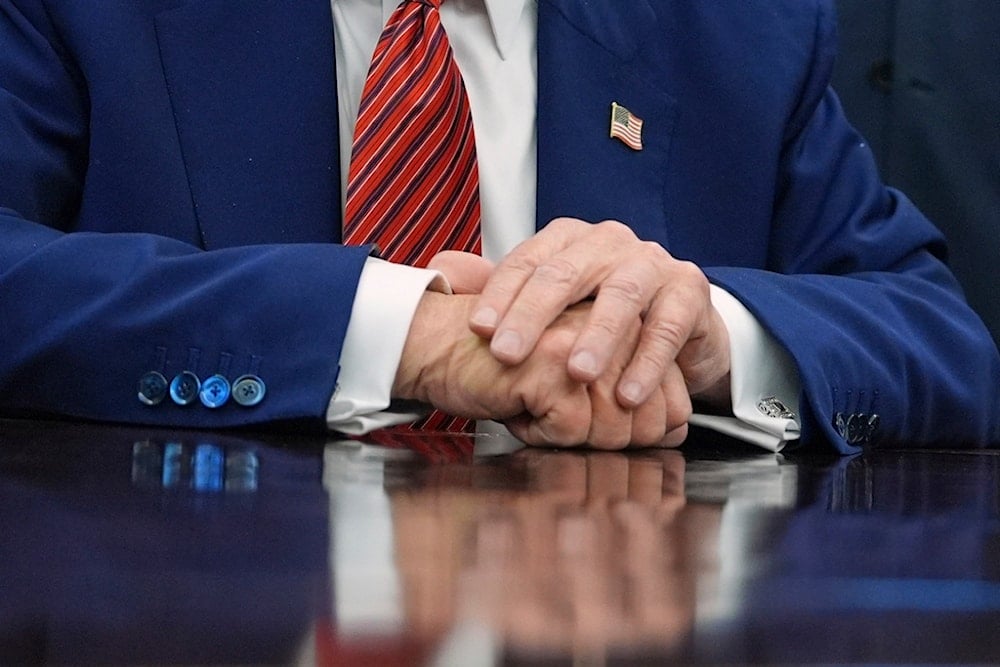US deal proposal allows Iran to enrich Uranium to low-level
The proposal, however, requires Iran to dismantle key infrastructure used for uranium processing and conversion, cease all new research into centrifuge development, and shut down underground enrichment facilities.
-

President Donald Trump rests his hands on the Resolute Desk as he speaks to reporters after signing executive orders regarding nuclear energy in the Oval Office of the White House, Friday, May 23, 2025, in Washington. (AP Photo/Evan Vucci)
In a surprising shift from its earlier hardline approach, the Trump administration has submitted a fresh nuclear proposal to Iran that would, under tight restrictions, permit limited uranium enrichment on Iranian territory, according to a report by Axios on Monday.
The proposal, delivered Saturday by US special envoy Steven Witkoff, outlines a framework that would allow Iran to enrich uranium at low levels, for a duration to be determined during negotiations.
However, the draft imposes significant conditions: Iran would be banned from building any new enrichment sites, required to dismantle key infrastructure used for uranium processing and conversion, and compelled to cease all new research into centrifuge development.
Additionally, Iran would need to scale back enrichment activities to just 3% concentration and shut down underground enrichment facilities.
Sanctions relief would only be granted after Tehran "demonstrates real commitment" to the terms, satisfying both Washington and the International Atomic Energy Agency (IAEA), according to the report.
Enrichment Standoff
Despite this overture, Tehran remains steadfast in its position. Foreign Minister Abbas Araghchi reaffirmed Iran's right to enrich uranium, stating, "Iran is ready to take measures to prove the peaceful nature of its nuclear program and does not plan to give up uranium enrichment."
He added that uranium enrichment is a sovereign right under international agreements and cannot be relinquished.
Iranian officials have expressed skepticism about the US proposal, labeling it a "non-starter" that fails to address Tehran's core demands, including immediate sanctions relief and recognition of its right to peaceful nuclear enrichment.
A senior Iranian diplomat indicated that Iran is drafting a negative response to the proposal, highlighting the lack of clarity on lifting sanctions and the continued US insistence on ending uranium enrichment.
Read more: White House reportedly pauses new US sanctions on Iran amid talks: WSJ
The ongoing negotiations, mediated by Oman, have seen five rounds of indirect talks, with the latest held in Rome on May 23. While both sides have shown some flexibility, fundamental disagreements persist.
Iran demands guarantees that any future deal won't be unilaterally voided by Washington, as was the case with the 2015 nuclear agreement.
AEOI reaffirms enrichment as Iran's 'red line'
Complicating matters further, the IAEA reported that Iran has significantly increased its stockpile of 60% enriched uranium, nearing weapons-grade levels. Iran dismissed the report as politically motivated, asserting that its nuclear activities remain under IAEA oversight and are solely for peaceful purposes.
Speaking to national television on Sunday, The Head of the Atomic Energy Organization of Iran (AEOI), Mohammad Eslami stated that uranium enrichment remains a fundamental and non-negotiable element of Iran’s nuclear strategy.
“This issue is known as the red line for the Islamic Republic of Iran. There is no alternative to enrichment,” he stressed.
The Iranian official explained that the fuel cycle cannot exist without enrichment, and without it, critical research and applications in medicine, industry, and energy would be compromised.

 3 Min Read
3 Min Read









